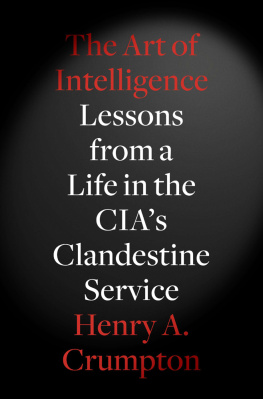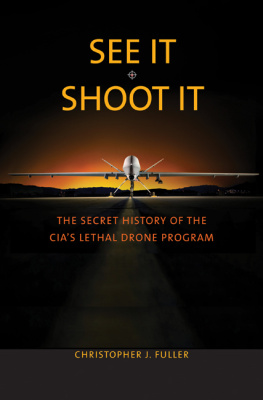THE ART OF
INTELLIGENCE
THE ART OF
INTELLIGENCE

LESSONS FROM A LIFE IN
THE CIAS CLANDESTINE SERVICE

HENRY A. CRUMPTON
T HE P ENGUIN P RESS
New York
2012
THE PENGUIN PRESS
Published by the Penguin Group
Penguin Group (USA) Inc., 375 Hudson Street, New York, New York 10014, U.S.A. Penguin Group (Canada), 90 Eglinton Avenue East, Suite 700, Toronto, Ontario, Canada M4P 2Y3 (a division of Pearson Penguin Canada Inc.) Penguin Books Ltd, 80 Strand, London WC2R 0RL, England Penguin Ireland, 25 St. Stephens Green, Dublin 2, Ireland (a division of Penguin Books Ltd) Penguin Books Australia Ltd, 250 Camberwell Road, Camberwell, Victoria 3124, Australia (a division of Pearson Australia Group Pty Ltd) Penguin Books India Pvt Ltd, 11 Community Centre, Panchsheel Park, New Delhi 110 017, India Penguin Group (NZ), 67 Apollo Drive, Rosedale, Auckland 0632, New Zealand (a division of Pearson New Zealand Ltd) Penguin Books (South Africa) (Pty) Ltd, 24 Sturdee Avenue, Rosebank, Johannesburg 2196, South Africa
Penguin Books Ltd, Registered Offices:
80 Strand, London WC2R 0RL, England
First published in 2012 by The Penguin Press,
a member of Penguin Group (USA) Inc.
Copyright Henry A. Crumpton, 2012
All rights reserved
All statements of fact, opinion, or analysis expressed are those of the author and do not reflect the official positions or views of the CIA or any other U.S. Government agency. Nothing in the contents should be construed as asserting or implying U.S. Government authentication of information or Agency endorsement of the authors views. This material has been reviewed by the CIA to prevent the disclosure of classified information.
LIBRARY OF CONGRESS CATALOGING IN PUBLICATION DATA
Crumpton, Henry A.
The art of intelligence : lessons from a life in the CIAs clandestine service / Henry A. Crumpton.
p. cm.
Includes index.
ISBN: 978-1-101-57222-1
1. Crumpton, Henry A. 2. Intelligence officersUnited StatesBiography. 3. United States. Central Intelligence AgencyBiography. 4. Intelligence serviceUnited States. 5. Intelligence serviceMethodology. I. Title.
JK468.I6C78 2012
327.12730092dc23
[B]
2011041978
Printed in the United States of America
1 3 5 7 9 10 8 6 4 2
DESIGNED BY MEIGHAN CAVANAUGH
No part of this book may be reproduced, scanned, or distributed in any printed or electronic form without permission. Please do not participate in or encourage piracy of copyrighted materials in violation of the authors rights. Purchase only authorized editions.
ALWAYS LEARNING
PEARSON
For Cindy Lou, the love of my life, and our three sons.
And for all the families who sacrifice and serve, unknown and unsung.
A portion of the proceeds from this book is being donated to the CIA Officers Memorial Foundation which was established in December 2001 to provide educational support to the children of CIA officers killed in the line of duty. For more information about the foundation please visit: www.ciamemorialfoundation.org.
INTRODUCTION
I N THE SUMMER OF 2002 , I EMBARKED ON A NEW MISSION . After two decades in the CIAs Clandestine Service, including the last ten months leading the CIAs Afghanistan campaign, it was time for a change.
This mission was a departure for me. There were no Mi-17 helicopters, unmanned aerial vehicle (UAV) Predators, M4 assault rifles, Glock model 19 pistols, ceramic-plated body armor, inoculations, polygraphs, disguises, cover, or even basic tradecraft. There was no surveillance to avoid, agents to run, or terrorists to nullify. The assignment did, however, require that I enter a strange culture, readjust my attitude, and assume a different identity.
I returned to university as a student.
The CIA granted me an academic sabbatical at the Paul H. Nitze School of Advanced International Studies (SAIS) at Johns Hopkins University. This new assignment, more sedate than some recent experiences, was nevertheless exciting. It was a full academic year of intellectual indulgence. I gorged on a feast of courses and books covering political thought, military strategy, China, history, foreign policy, terrorism, and philosophy. I savored it all.
Searching the Spring Semester 2003 course catalog, I stumbled across something unexpected: a class on intelligence. The catchy title The Art and Tradecraft of Intelligence prompted me to research the background of the courses professor, Dr. Jennifer Sims. She had an impressive rsum, both in academia and government.
As a veteran intelligence professional still on the CIA payroll, I felt obliged to take the course. I also figured the class would be fun and easy.
It was a hoot. We explored how George Washington, one of Americas great spymasters, ran agents with superb tactical tradecraft and then brilliantly exploited their intelligence for strategic value. We studied the advances of intelligence capabilities in the U.S. Civil War. We learned that President Lincoln spent many of his days in the White House telegraph room, turning it into his de facto intelligence and command center. We followed how the advent of wireless telecommunications, airplanes, radar, satellites, and other technical marvels transformed intelligence throughout the twentieth century.
We observed how, unlike Washington and Lincoln, most political leaders forging national security policy and waging war failed to understand or appreciate intelligence. When they also failed to keep pace with geopolitical changes, it was in part because of the gaps among intelligence collection, intelligence analysis, and policy implementation. We reflected on how the government and the broader society perceived and treated intelligence professionals, with comments swinging from deep loathing to cartoonish fantasy. Uninformed and sometimes unreasonable expectations, low and high, of intelligence professionals have whipsawed these officers and their agencies throughout U.S. history. As a nation, our collective ignorance of intelligence has undermined not only our intelligence capabilities, but ultimately the policy makers and citizens served.
Although enjoyable, the class was not easy. Dr. Sims demanded far more study and thought than I anticipated. It was almost embarrassing to realize how much I did not know and how much I learnedeven with my many years of experience in espionage, covert action, and war on several continents. Although chagrined by my own ignorance, I was enthralled by the learning experience.
I gained a broader perspective, well beyond the intelligence business, during this academic interlude. It was the first time in twenty years that I was not focused just on the immediate, operational tasks of intelligence. With the opportunity to study and reflect, I better appreciated that the world was transforming rapidly, not least in terms of the nature of conflict, risk, competition, and cooperation. But there was one common denominator: The value of intelligence was increasing. Our Afghanistan campaign of 200102 offered many examples of this. The transformative geopolitical trends of our time, many fueled by exponential advances in technology, suggest that intelligence will play an even greater role in an increasingly interdependent and complex world. Our collective understanding and appreciation for intelligence, however, lags far behind our countrys needs, just as it often has throughout U.S. history.







